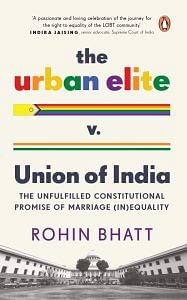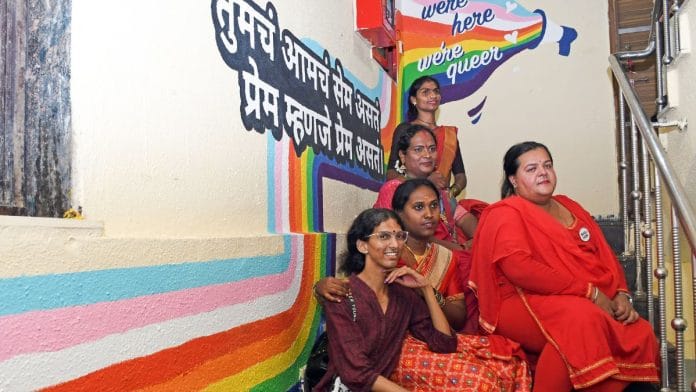We are at a phase in the queer movement where we have seen that it is increasingly becoming lawyer-centric. For the smallest of issues, people seem to rush to the Supreme Court. What this frequently results in is half-baked petitions, and often damage to the movement itself. While in any legal discourse on rights in India, the Constitution is a sine qua non, using it as the only weapon that a movement can wield does not serve the purpose.
It must be a major tool in the toolbox but be complemented with other tools such as social realities and historical facts so that the complexities of the lives led by the people of this country are accurately captured in petitions. We have not done that so far, save for a few instances.
I do not blame the clients who often do not know the right course of action. I blame the lawyers who take certain matters to court. They must guide their clients appropriately. But they do not, for the wide reportage of queer issues has turned litigating such issues, often without a basic understanding of the community itself, into a cake that everyone wants a piece of, often with self-serving interests. ‘I want to do LGBT cases and become famous,’ (sic) an unsuspecting lawyer once told me. This of course also results in the movement being co-opted by lawyers, as we have been warned against repeatedly.
Also read: LGBT+ people hide at work, can’t claim queer spaces easily either. Bengaluru fest is freeing
We can, however, avoid this. As I was saying, there is now a new age of social movements and social justice litigation which is informed by a State which is increasingly clamping down on civil society in the form of tax raids, choking funding, jailing dissidents under terror laws, criminalizing any form of dissent, making free speech nearly impossible. When issues like marriage equality are taken up in the Supreme Court, which affects the rights of the queer community at large, the time has come for a more participative process to evolve in the system.
Unlike other movements, like the feminist movements, where on broad issues there is a seeming consensus, the queer movement lacks one. That is primarily because there are not enough places where conversations can take place, or platforms where the community can discuss issues, irrespective of our disagreements, howsoever vehement they may be. Yet, when PILs are filed in the Supreme Court, they do affect the community at large. As a result, what we have is that many members of the community who may not be in Delhi or urban India are left out of conversations and eventually disenfranchised.
This becomes more acute when much of the movement is judicialized. I do not dispute that in cases where the rights of an individual are violated, theyshould be free to move the court. However, when issues like marriage equality are filed as PILs, it calls for a participative litigation that is more inclusive and collaborative. When I talk about a collaborative litigation strategy, I do not mean merely on which issues to take to court and when, but the broader set of decisions, including negotiating legal strategy, sounding out arguments, etc.
If we, as lawyers who represent queer causes and are also queer, think of ourselves as leaders or are projected by the media to be leaders of the movement (and we usually do, because of our own hubris), we must acknowledge that there is a multiplicity of political voices within the community. All of them must be heard, and a litigation strategy must be decided in a consultative process.
We cannot create a movement and centre it on a radical critique of existing power hierarchies if they manifest within our movements too. When we have created a movement around litigation—and I admit to my part in it—I also believe that we as lawyers should be held to account by the movement. There has to be an accountability mechanism, which focuses on centring the movement’s participation in the litigation process.
Also read: ‘If Sanskrit is made by gods, is Marathi made by thieves?’ asked a 14th-century saint-poet
We cannot be hostile to grassroots activists, or to the tireless work of community organizers, but see them as equal participants, where they are not dismissed to make the most perfunctory decisions in legal strategies if they are involved, or worse, as a means to an end by providing lawyers with petitioners.
In litigation-driven movements like the queer rights movement, lawyers have to remember that there are competing interests of the petitioners, often on the same side of the debate. For example, in the marriage equality case, Rituparna Borah’s petition went on a different tangent, seeking recognition of chosen families on account of violence from natal family, and was not per se a petition seeking marriage. The process of drafting and arguing these petitions, therefore, must be democratic, and transcend the bounds of the traditional lawyer–client relationship.
In a typical scenario, a client comes to the lawyer with the facts of the case and relies on his expertise as a legal professional to supply the requisite legal advice and guide the client on possible outcomes. However, in public interest cases, the client often arrives with the outcomes that they want to be reached, and the lawyer has to mould the law and the legal arguments to arrive at it and reverse engineer the case. Clients in these cases often know more about the issue than the lawyers themselves (and dare I say, that includes the law), and it is imperative that we tap into their lived experiences and knowledge as important resources.
 This excerpt from Rohin Bhatt’s ‘The Urban Elite v. Union of India: The Unfulfilled Constitutional Promise of Marriage Equality’ has been published with permission from Penguin Random House India.
This excerpt from Rohin Bhatt’s ‘The Urban Elite v. Union of India: The Unfulfilled Constitutional Promise of Marriage Equality’ has been published with permission from Penguin Random House India.






